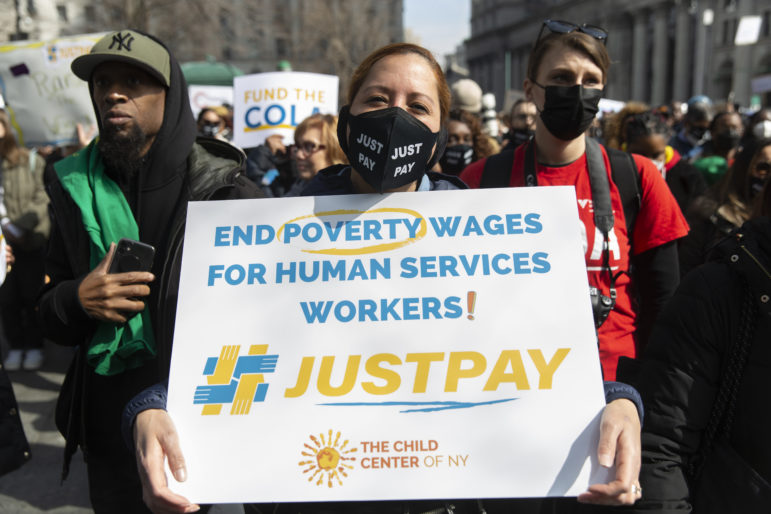“The very forces contributing to a worsening housing emergency are also impacting the workers tasked with solving that crisis. Those who work to find permanent and safe apartments for the housing-insecure and homeless should not find themselves at risk of eviction and displacement.”

John McCarten/NYC Council Media Unit
Workers at a rally outside City Hall in March.As New York’s homelessness emergency reaches levels unseen since the Great Depression, tens of thousands of human service workers are stepping up and answering the noble call to address the crisis. Unfortunately, many of those workers are not paid a living wage by the city contracts that fund the vital work of caring for those in need in our community.
The good news is that Mayor Eric Adams and the City Council can take an important step toward correcting this injustice by including a 5.4 percent cost-of-living adjustment (COLA) for these workers in the 2023 budget. This amount would match the COLA that Gov. Kathy Hochul and the state legislature put in their recently finalized budget.
Let us be clear: this is simply the right thing to do. Time and time again, the human services workforce has answered the call from the city government—no matter how difficult the challenge or challenging the circumstances. Their dedication has never been clearer than right now, more than two years into a pandemic that has seen frontline staff working long hours keeping vulnerable New Yorkers safe despite the risk to themselves and their families. In their line of work, telecommuting was never an option.
Human service workers are predominantly women and people of color, who are already more likely to experience pay disparity. The city government is perpetuating this injustice with inadequate and antiquated contract structures that pay wages that are insufficient in the modern economy.
Including a human services COLA in the budget is also a matter of sound public policy. In fact, the very forces contributing to a worsening housing emergency—city rents rising at an average of 33 percent, which is almost double the national average—are also impacting the workers tasked with solving that crisis. Those who work to find permanent and safe apartments for the housing-insecure and homeless should not find themselves at risk of eviction and displacement.
Facing rising rents, reduced purchasing power, and soaring inflation, private sector jobs hold the promise of higher salaries for human service workers with deep technical and interpersonal expertise. Workers should not have to choose between a meaningful career of service and earning a living wage.
This has already reached a crisis point, and it will only get worse. The human service sector is experiencing unsustainable levels of turnover and vacancies for behavioral health, shelter, and affordable housing support positions. Staffing shortages and hiring difficulties compound feelings of burnout, force longer working hours, and threaten the quality of service offered by those who choose to stay in the public sector.
If this funding does not make the final budget, who will be left to provide essential services to our most vulnerable neighbors during this ongoing emergency, let alone when the next crisis hits?
Myung Lee is president and CEO of VOA-Greater New York, an anti-poverty organization with more than 125 years of experience serving New Yorkers in need.








